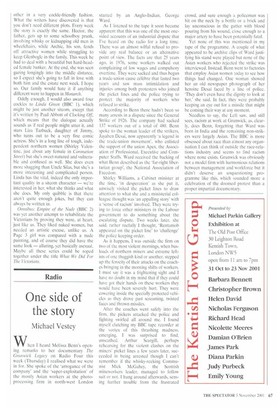Radio
One side of the story
Michael Vestey
When I heard Melissa Benn's opening remarks to her documentary The Grim wick Legacy on Radio Four this week (Thursday) I realised what we were in for. She spoke of the 'arrogance of the company' and the `super-exploitation' of the mostly Asian workers at the photoprocessing firm in north-west London
started by an Anglo-Indian, George Ward.
As I listened to the tape it soon became apparent that this was one of the most onesided accounts of an industrial dispute that I've heard on the radio for a long time. There was an almost wilful refusal to provide any real balance or an alternative point of view. The facts are that 25 years ago, in 1976, some workers walked out complaining of low wages and compulsory overtime. They were sacked and thus began a trade-union cause célèbre that lasted two years and saw mass intimidation and injuries among both protesters who joined the picket lines and the police trying to protect the majority of workers who refused to strike.
According to Benn there hadn't been so many arrests in a dispute since the General Strike of 1926. The company had sacked 137 workers out of a total of 480. Benn spoke to the woman leader of the strikers, Jayaben Desai, now apparently 'a legend in the trade-union movement', who enlisted the support of the union Apex, the Association of Professional, Executive and Computer Staffs. Ward received the backing of what Berm described as the 'far-right libertarian group', the National Association of Freedom.
Shirley Williams, a Cabinet minister at the time, 'in desperation' as she put it, unwisely visited the picket lines to draw attention to what she and a ministerial colleague thought was 'an appalling story' with a 'sense of racism' involved. They were trying to force other ministers in the Labour government to do something about the escalating dispute. Two weeks later, she said, rather ruefully I thought, `Rentamob appeared on the picket line' to 'challenge' the police keeping order.
As it happens, I was outside the firm on two of the most violent mornings, when busloads of northern miners and extreme leftists of one thuggish kind or another, stepped up the ferocity of their attacks on the coaches bringing in the morning shifts of workers.
I must say it was a frightening sight and I have no doubt in my mind that if they could have got their hands on these workers they would have been severely hurt. They were cowering inside the specially protected vehicles as they drove past screaming, twisted faces and thrown missiles.
After the coaches went safely into the firm, the pickets attacked the police and fighting swirled all around me. I found myself clutching my BBC tape recorder at the vortex of this thrashing madness, emerging, I was surprised to find, unscathed. Arthur Seargill, perhaps rehearsing for the violent clashes on the miners picket lines a few years later, succeeded in being arrested though I can't remember if the whisky-reeking Communist Mick McGahey, the Scottish mineworkers leader, managed to follow suit or not. I hung around afterwards, sensing further trouble from the frustrated crowd, and sure enough a policeman was hit on the neck by a bottle or a brick and lay unconscious in the gutter with blood pouring from his wound, close enough to a major artery to have been potentially fatal.
Yet none of this was mentioned in my tape of the programme. A couple of what appeared to be archive clips of Ward justifying his stand were played but none of the Asian workers who rejected the strike was interviewed. Instead. Benn went to factories that employ Asian women today to see how things had changed. One woman showed her an old newspaper photograph of her heroine Desai faced by a line of police. 'They don't even have the dignity to look at her,' she said. In fact, they were probably keeping an eye out for a missile that might be coming their way at any moment.
Needless to say, the Left saw, and still sees, racism at work at Grunwick, as, clearly, does Benn, forgetting that Ward was born in India and the remaining non-strikers were largely Asian. The BBC is more obsessed about race than almost any organisation I can think of outside the race-relations industry and seems to find racism where none exists. Grunwiek was obviously not a model firm with harmonious relations between management and workforce but it didn't deserve an unquestioning programme like this, which sounded more a celebration of the doomed protest than a proper impartial documentary.


















































































 Previous page
Previous page